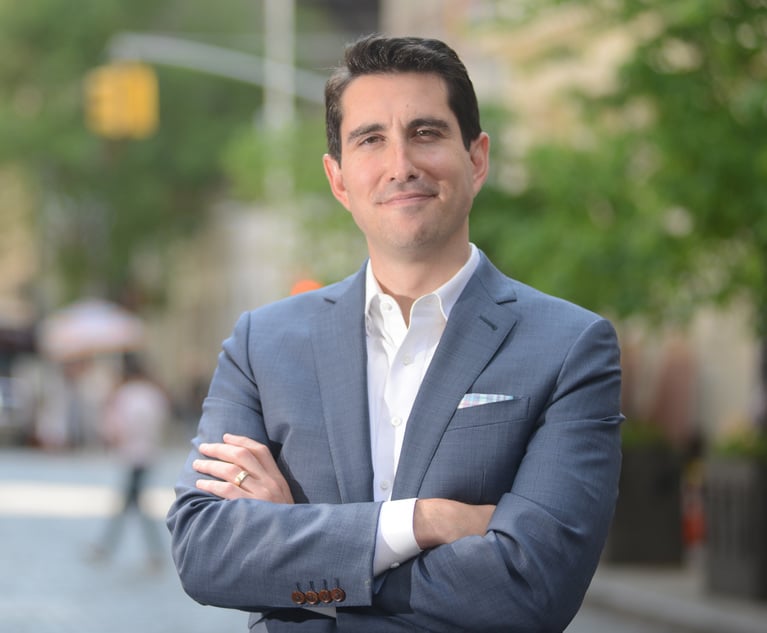CCPA 2.0 Backers Say They Have the Signatures to Get on the California Ballot
"Fewer businesses are covered [under the California Privacy Rights Act].," says Alastair Mactaggart, founder of Californians for Consumer Privacy. "My intention all along with this was to regulate the businesses that cause problems,"
May 12, 2020 at 12:00 PM
3 minute read
The original version of this story was published on Corporate Counsel
 (Photo: Alexander Supertramp/Shutterstock.com)
(Photo: Alexander Supertramp/Shutterstock.com)
The California Privacy Rights Act, the ballot initiative aimed to regulate large companies that collect large amounts of data, has enough signatures to be considered to be on the ballot during the November general election. However, in-house counsel and their companies have a while before they need to become concerned with its implications.
Californians for Consumer Privacy, the group headed by real estate developer Alastair Mactaggart, announced that 900,000 voters have signed on to have the CPRA go to the ballot in November.
Mactaggart said in an interview on Monday the organization is in the process of having those signatures verified by the counties. The ballot initiative will then have to be approved by the California Secretary of State. He said that process should be completed in the next couple of months.
However, even if the initiative gets approved to be on the ballot during the general election in November, in-house counsel have plenty of time to figure out how to comply with it. Right now, there are more pressing matters legal departments and their firms have to consider with regard to privacy in California.
"We are more concerned with the July 1 enforcement date of the CCPA," Natalie Prescott, an associate at Mintz, Levin, Cohn, Ferris, Glovsky and Popeo in San Diego, told Corporate Counsel.
She explained that attorney general Xavier Becerra has not yet published the final guidelines for the CCPA but intends on keeping the July 1 enforcement date despite businesses asking for more time because of work arrangements necessitated by the new coronavirus.
"All of the commentary that I am seeing indicates it [CPRA] is more likely to pass," Prescott explained.
Further, the CPRA wouldn't take effect until 2023. During that time, the California state government would have to create a new agency, the California Privacy Protection Agency, to oversee and enforce data privacy. The CPRA would also give California citizens a right to which would force businesses to stop using sensitive personal information without consent and triple fines for collecting and selling children's private information.
Mactaggart noted that he is facing less opposition from big corporations than he did when he introduced the CCPA as a ballot measure in 2018.
"I think the world has moved on a lot over the past couple of years and it is harder to oppose privacy policies," Mactaggart said.
According to data provided by Californians for Consumer Privacy, 88% of California voters, of 777 surveyed, said they would vote in favor of a law that expands privacy protections for personal information.
He also said the CPRA would decrease the number of businesses covered under the law.
"We go back to the threshold of covering companies that process over 100,000 pieces of information a year," Mactaggart said.
Right now the CCPA covers businesses that process 50,000 pieces of information a year. Mactaggart said the CCPA originally covered businesses that process 100,000 pieces of information a year, but that was changed when it went to the Legislature instead of being voted on for the general election.
"Fewer businesses are covered [under the CPRA]. My intention all along with this was to regulate the businesses that cause problems," Mactaggart explained.
This content has been archived. It is available through our partners, LexisNexis® and Bloomberg Law.
To view this content, please continue to their sites.
Not a Lexis Subscriber?
Subscribe Now
Not a Bloomberg Law Subscriber?
Subscribe Now
NOT FOR REPRINT
© 2025 ALM Global, LLC, All Rights Reserved. Request academic re-use from www.copyright.com. All other uses, submit a request to [email protected]. For more information visit Asset & Logo Licensing.
You Might Like
View All
Kraken’s Chief Legal Officer Exits, Eyes Role in Trump Administration
3 minute read

Collectible Maker Funko Wins Motion to Dismiss Securities Class Action

How Tony West Used Transparency to Reform Uber's Toxic Culture
Law Firms Mentioned
Trending Stories
Who Got The Work
J. Brugh Lower of Gibbons has entered an appearance for industrial equipment supplier Devco Corporation in a pending trademark infringement lawsuit. The suit, accusing the defendant of selling knock-off Graco products, was filed Dec. 18 in New Jersey District Court by Rivkin Radler on behalf of Graco Inc. and Graco Minnesota. The case, assigned to U.S. District Judge Zahid N. Quraishi, is 3:24-cv-11294, Graco Inc. et al v. Devco Corporation.
Who Got The Work
Rebecca Maller-Stein and Kent A. Yalowitz of Arnold & Porter Kaye Scholer have entered their appearances for Hanaco Venture Capital and its executives, Lior Prosor and David Frankel, in a pending securities lawsuit. The action, filed on Dec. 24 in New York Southern District Court by Zell, Aron & Co. on behalf of Goldeneye Advisors, accuses the defendants of negligently and fraudulently managing the plaintiff's $1 million investment. The case, assigned to U.S. District Judge Vernon S. Broderick, is 1:24-cv-09918, Goldeneye Advisors, LLC v. Hanaco Venture Capital, Ltd. et al.
Who Got The Work
Attorneys from A&O Shearman has stepped in as defense counsel for Toronto-Dominion Bank and other defendants in a pending securities class action. The suit, filed Dec. 11 in New York Southern District Court by Bleichmar Fonti & Auld, accuses the defendants of concealing the bank's 'pervasive' deficiencies in regards to its compliance with the Bank Secrecy Act and the quality of its anti-money laundering controls. The case, assigned to U.S. District Judge Arun Subramanian, is 1:24-cv-09445, Gonzalez v. The Toronto-Dominion Bank et al.
Who Got The Work
Crown Castle International, a Pennsylvania company providing shared communications infrastructure, has turned to Luke D. Wolf of Gordon Rees Scully Mansukhani to fend off a pending breach-of-contract lawsuit. The court action, filed Nov. 25 in Michigan Eastern District Court by Hooper Hathaway PC on behalf of The Town Residences LLC, accuses Crown Castle of failing to transfer approximately $30,000 in utility payments from T-Mobile in breach of a roof-top lease and assignment agreement. The case, assigned to U.S. District Judge Susan K. Declercq, is 2:24-cv-13131, The Town Residences LLC v. T-Mobile US, Inc. et al.
Who Got The Work
Wilfred P. Coronato and Daniel M. Schwartz of McCarter & English have stepped in as defense counsel to Electrolux Home Products Inc. in a pending product liability lawsuit. The court action, filed Nov. 26 in New York Eastern District Court by Poulos Lopiccolo PC and Nagel Rice LLP on behalf of David Stern, alleges that the defendant's refrigerators’ drawers and shelving repeatedly break and fall apart within months after purchase. The case, assigned to U.S. District Judge Joan M. Azrack, is 2:24-cv-08204, Stern v. Electrolux Home Products, Inc.
Featured Firms
Law Offices of Gary Martin Hays & Associates, P.C.
(470) 294-1674
Law Offices of Mark E. Salomone
(857) 444-6468
Smith & Hassler
(713) 739-1250






